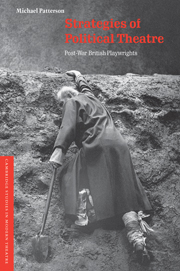Book contents
- Frontmatter
- Contents
- Acknowledgments
- Brief chronology, 1953–1989
- Introduction
- Part 1 Theory
- Part 2 Two model strategies
- 2 The ‘reflectionist’ strategy: ‘kitchen sink’ realism in Arnold Wesker's Roots (1959)
- 3 The ‘interventionist’ strategy: poetic politics in John Arden's Serjeant Musgrave's Dance (1959)
- Part 3 The reflectionist strain
- Part 4 The interventionist strain
- Conclusion
- Notes
- Select bibliography
- Index
2 - The ‘reflectionist’ strategy: ‘kitchen sink’ realism in Arnold Wesker's Roots (1959)
Published online by Cambridge University Press: 22 September 2009
- Frontmatter
- Contents
- Acknowledgments
- Brief chronology, 1953–1989
- Introduction
- Part 1 Theory
- Part 2 Two model strategies
- 2 The ‘reflectionist’ strategy: ‘kitchen sink’ realism in Arnold Wesker's Roots (1959)
- 3 The ‘interventionist’ strategy: poetic politics in John Arden's Serjeant Musgrave's Dance (1959)
- Part 3 The reflectionist strain
- Part 4 The interventionist strain
- Conclusion
- Notes
- Select bibliography
- Index
Summary
Optimism in art is the result not of happy endings and joyful exclamations but of the recognition of truths … whether the truth is a sad one or not.
In 1959 two major political plays were performed, Wesker's Roots and Arden's Serjeant Musgrave's Dance. Both playwrights were young men, not yet out of their twenties. Both had enjoyed moderate successes the previous year with, respectively, Chicken Soup with Barley and Live Like Pigs. Above all, both writers, informed by a socialist viewpoint, expressed a profound dissatisfaction with the society around them, earning them the journalistic tag ‘Angry Young Men’. However, their strategies for communicating ‘the recognition of truths’ to an audience differed profoundly. While, as we shall see, Arden explored new forms, Wesker, like the other notorious ‘angry young man’, John Osborne, continued to write in a conventionally realistic mode, familiar to London theatre-goers from the plays of Terence Rattigan and Noel Coward. Wesker retained a formal act structure with emphatic endings, realistically detailed settings, realistic-sounding dialogue and rounded characters. The major change was to place all this in a lower-working-class setting, with all its shabby detail, giving him the other journalistic sobriquet ‘kitchen-sink realist’. However, while Roots does indeed have its kitchen sink, there is more to the play than an attempt to imitate the real life of the Norfolk people it depicts.
- Type
- Chapter
- Information
- Strategies of Political TheatrePost-War British Playwrights, pp. 27 - 43Publisher: Cambridge University PressPrint publication year: 2003



